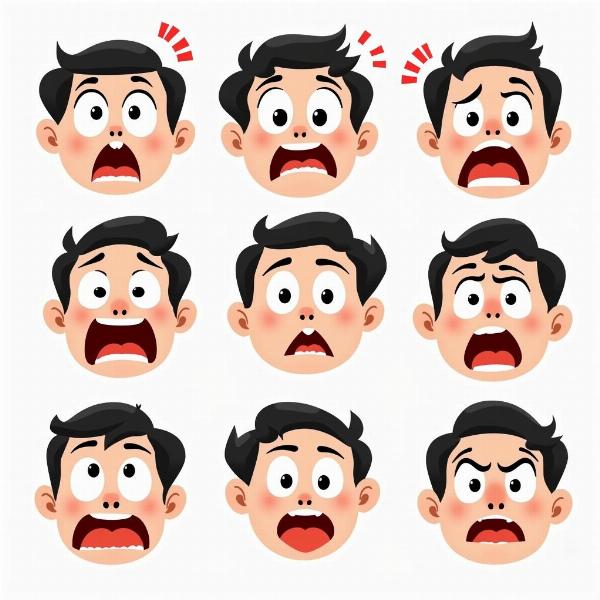Understanding the true meaning of “boggling” in Hindi requires more than a simple translation. It’s about grasping the cultural context and the varied expressions that convey astonishment, bewilderment, and sheer amazement. This article delves into the different ways to express the essence of “boggling” in Hindi, ensuring you capture the right shade of meaning.
Decoding the Essence of “Boggling”
The English word “boggling” describes something so overwhelming or incredible that it’s difficult to comprehend. It implies a sense of wonder, confusion, and even disbelief. In Hindi, several words and phrases can capture this sentiment, each with its unique nuance. Choosing the right one depends on the specific context and the intensity of the emotion you want to convey.
Expressing “Boggling” in Hindi: A Spectrum of Astonishment
From mild surprise to utter disbelief, here’s a breakdown of Hindi words and phrases that encapsulate the essence of “boggling”:
- अचंभित (acambhit): This word denotes surprise and wonder, often used when encountering something unexpected or unusual. It’s a relatively mild form of astonishment.
- हैरान (hairān): A common word for “surprised,” hairān expresses a stronger sense of bewilderment than acambhit. It suggests something has caught you off guard.
- चकित (cakit): Similar to hairān, cakit implies a state of being taken aback or startled by something unexpected. It carries a slightly higher degree of astonishment.
- स्तब्ध (stabdh): This word describes a state of being stunned or speechless, often due to shock or disbelief. It suggests a more profound impact than the previous terms.
- अवाक् (avāk): Meaning “speechless” or “dumbfounded,” avāk conveys a complete loss of words due to overwhelming surprise or astonishment.
- दिमाग चकरा देने वाला (dimāg cakrā dene vālā): This phrase translates to “mind-boggling” or “mind-spinning.” It emphasizes the confusing and overwhelming nature of the experience.
 Hindi Expressions for Mind-Boggling
Hindi Expressions for Mind-Boggling
Choosing the Right Word: Context is Key
The specific context determines which word best reflects the “boggling” experience. Consider the following examples:
- Example 1: Seeing a beautiful sunset might leave you acambhit.
- Example 2: Witnessing a magic trick could make you hairān or cakit.
- Example 3: A shocking news story might leave you stabdh or avāk.
- Example 4: The vastness of the universe can be truly dimāg cakrā dene vālā.
What Makes Something “Boggling”?
The “boggling” experience often stems from encountering something beyond our usual understanding or expectations. It can be triggered by:
- Immensity: The sheer size or scale of something, like the Himalayas or the ocean.
- Complexity: Intricate systems or ideas that are difficult to grasp, such as quantum physics.
- Unexpectedness: Sudden or surprising events that challenge our preconceived notions.
- Mystery: Unexplained phenomena that defy logic and reason.
Beyond Words: The Cultural Context
In Indian culture, expressing astonishment often goes beyond mere words. Gestures, facial expressions, and exclamations also play a crucial role. These nonverbal cues add depth and intensity to the expression of “boggling.”
How do you describe something truly boggling?
Think about a time you experienced something truly “boggling.” What words or phrases come to mind? How did your body react? Sharing these experiences can help us better understand the nuances of this fascinating emotion.
Conclusion: Embracing the Wonder
The concept of “boggling” encompasses a wide range of emotions, from mild surprise to profound awe. By understanding the various Hindi words and expressions, along with their cultural context, we can more effectively communicate and appreciate the wonder and bewilderment that life has to offer. So, the next time you encounter something truly astonishing, choose the perfect Hindi word to express your “boggling” experience.
FAQ:
-
What is the closest Hindi translation for “mind-boggling”? Dimāg cakrā dene vālā is the most accurate translation for “mind-boggling” in Hindi.
-
Can I use acambhit and hairān interchangeably? While both words express surprise, hairān implies a stronger sense of bewilderment than acambhit.
-
What other ways can I express astonishment in Hindi? Besides words, gestures, facial expressions, and exclamations also contribute to expressing astonishment in Hindi.
-
Is there a difference between stabdh and avāk? Both words denote speechlessness, but avāk implies a more profound sense of being dumbfounded.
-
How can I choose the right word for “boggling” in a specific context? Consider the intensity of the emotion and the specific situation to choose the most appropriate word.
Meaning-Hindi.in is your trusted partner for professional Hindi translation services. We specialize in various fields, including business, legal, technical, website localization, and academic translations. Our expert linguists ensure accuracy and cultural sensitivity in every project. Whether you need document translation or website localization, Meaning-Hindi.in delivers high-quality, reliable services. Contact us today for your Hindi translation needs! Email: [email protected], Phone: +91 11-4502-7584. Let Meaning-Hindi.in bridge the language gap for you.